牛津译林版七年级上册 Unit 6 Food and lifestyle 单元课时练习题二(含答案)
文档属性
| 名称 | 牛津译林版七年级上册 Unit 6 Food and lifestyle 单元课时练习题二(含答案) | 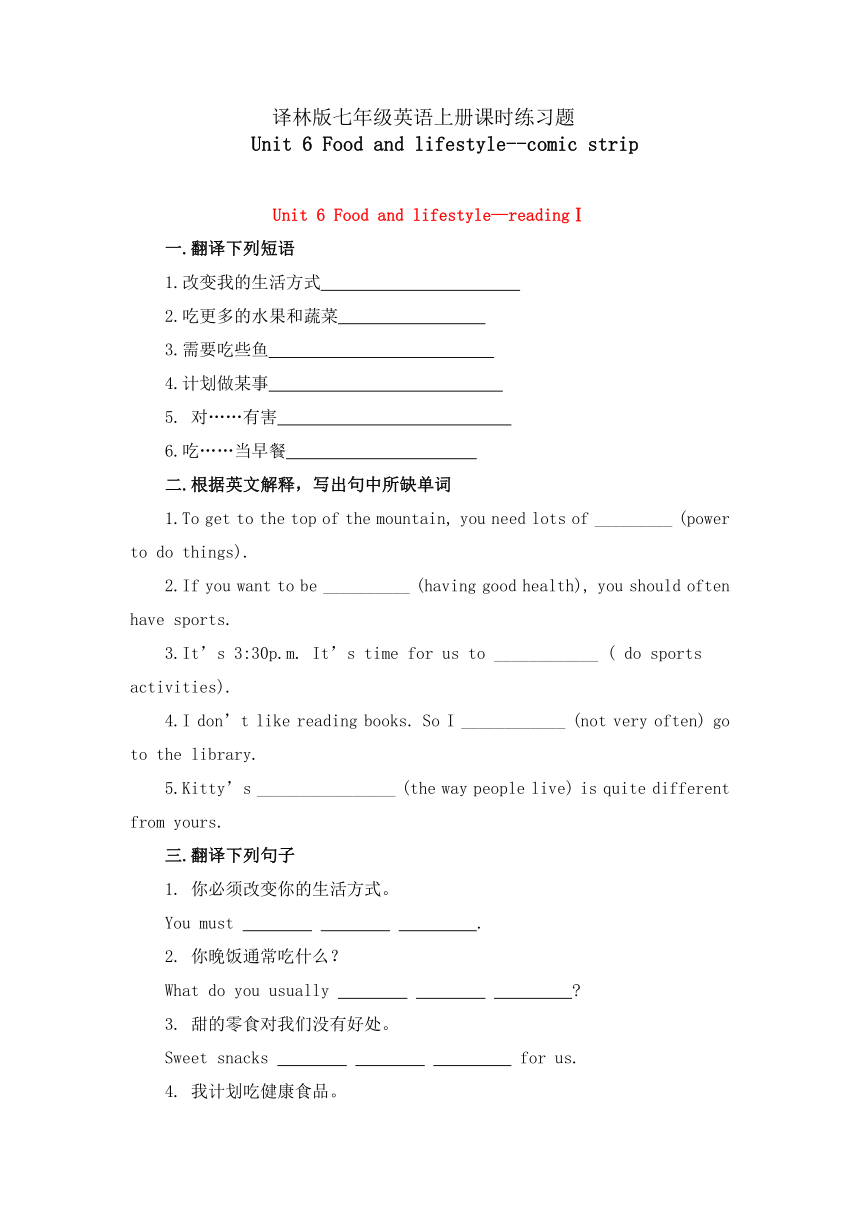 | |
| 格式 | docx | ||
| 文件大小 | 28.7KB | ||
| 资源类型 | 教案 | ||
| 版本资源 | 牛津译林版 | ||
| 科目 | 英语 | ||
| 更新时间 | 2022-12-08 21:56:40 | ||
图片预览

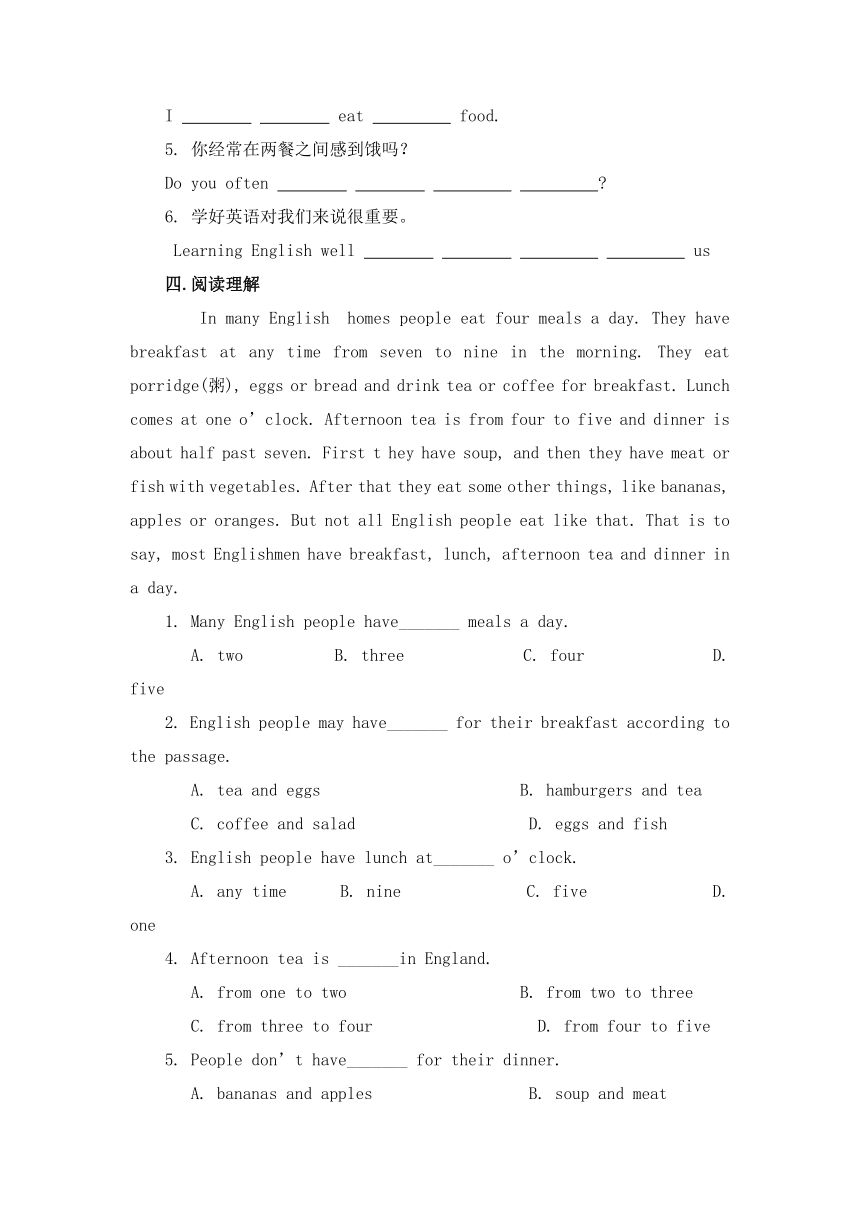
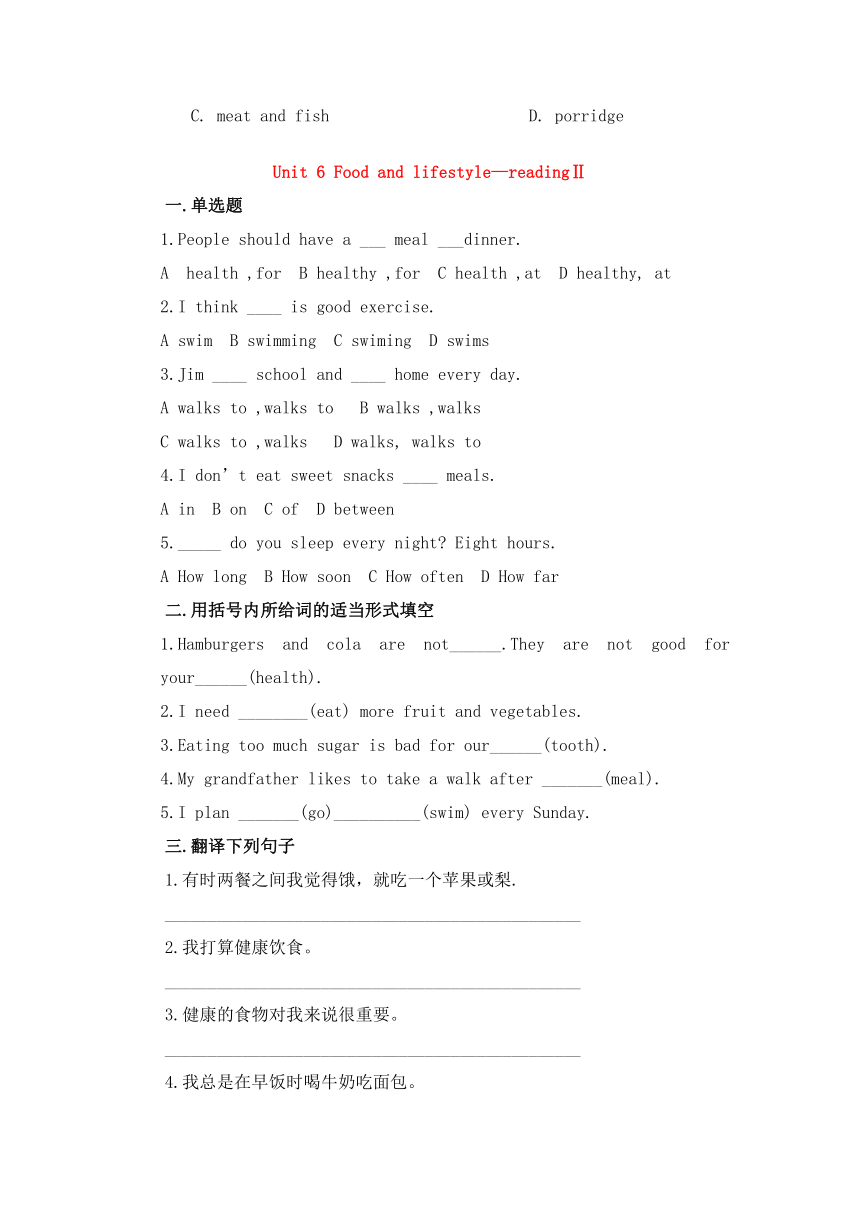
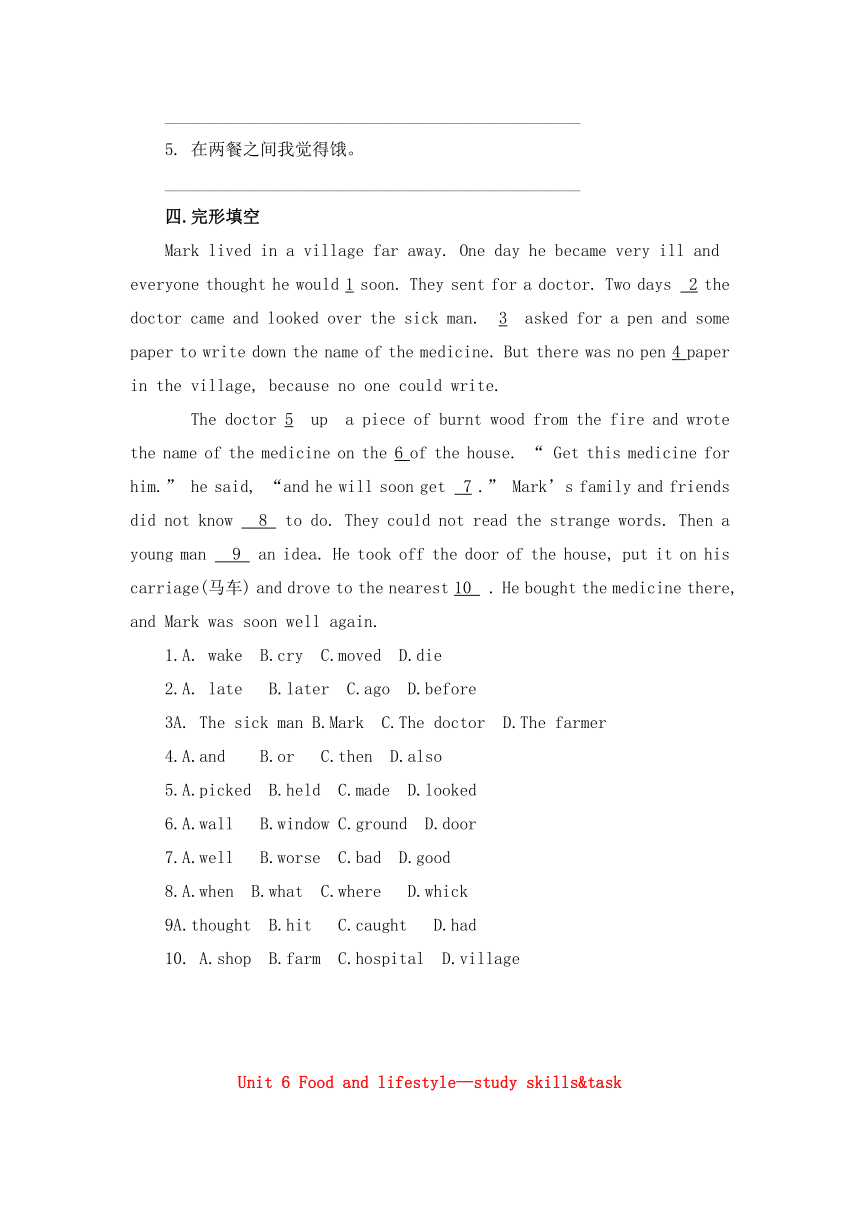
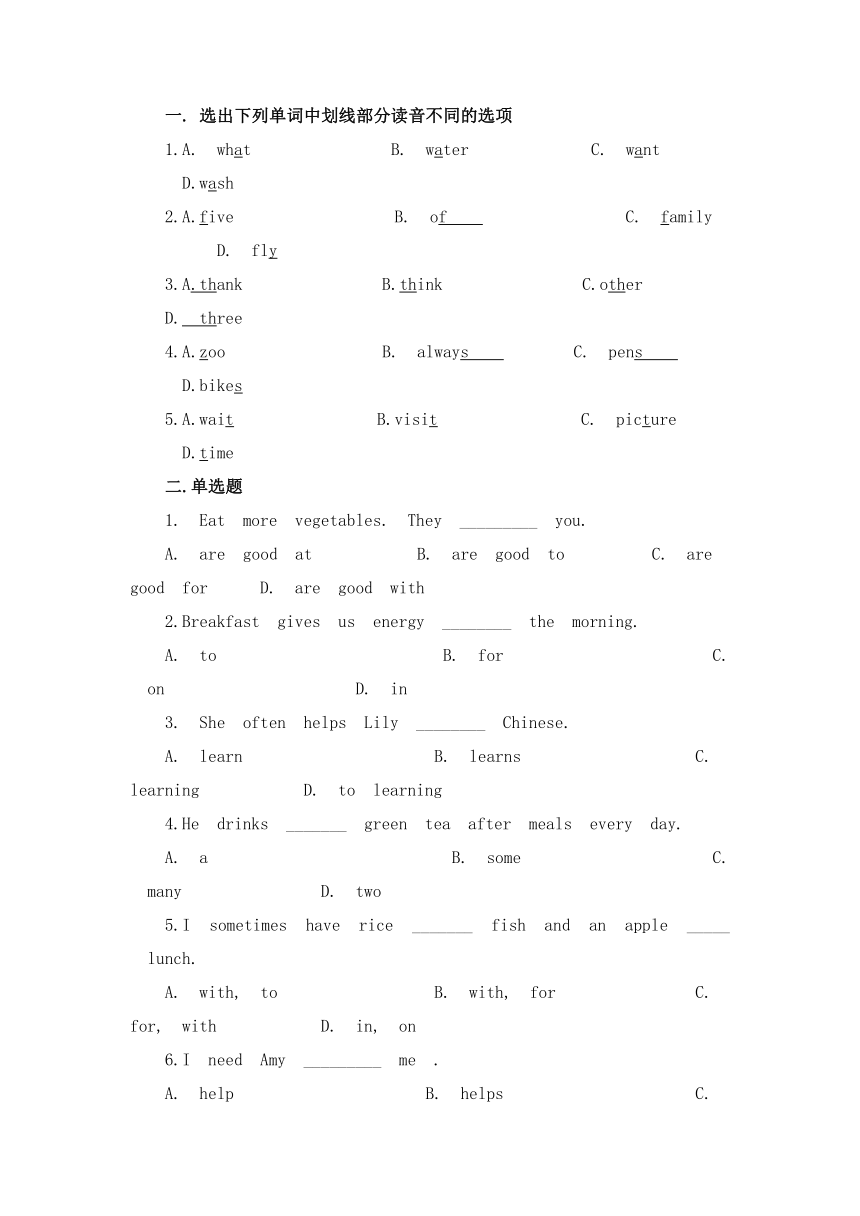
文档简介
译林版七年级英语上册课时练习题
Unit 6 Food and lifestyle--comic strip
Unit 6 Food and lifestyle—readingⅠ
一.翻译下列短语
1.改变我的生活方式
2.吃更多的水果和蔬菜
3.需要吃些鱼
4.计划做某事
5. 对……有害
6.吃……当早餐
二.根据英文解释,写出句中所缺单词
1.To get to the top of the mountain, you need lots of _________ (power to do things).
2.If you want to be __________ (having good health), you should often have sports.
3.It’s 3:30p.m. It’s time for us to ____________ ( do sports activities).
4.I don’t like reading books. So I ____________ (not very often) go to the library.
5.Kitty’s ________________ (the way people live) is quite different from yours.
三.翻译下列句子
1. 你必须改变你的生活方式。
You must .
2. 你晚饭通常吃什么?
What do you usually
3. 甜的零食对我们没有好处。
Sweet snacks for us.
4. 我计划吃健康食品。
I eat food.
5. 你经常在两餐之间感到饿吗?
Do you often
6. 学好英语对我们来说很重要。
Learning English well us
四.阅读理解
In many English homes people eat four meals a day. They have breakfast at any time from seven to nine in the morning. They eat porridge(粥), eggs or bread and drink tea or coffee for breakfast. Lunch comes at one o’clock. Afternoon tea is from four to five and dinner is about half past seven. First t hey have soup, and then they have meat or fish with vegetables. After that they eat some other things, like bananas, apples or oranges. But not all English people eat like that. That is to say, most Englishmen have breakfast, lunch, afternoon tea and dinner in a day.
1. Many English people have_______ meals a day.
A. two B. three C. four D. five
2. English people may have_______ for their breakfast according to the passage.
A. tea and eggs B. hamburgers and tea
C. coffee and salad D. eggs and fish
3. English people have lunch at_______ o’clock.
A. any time B. nine C. five D. one
4. Afternoon tea is _______in England.
A. from one to two B. from two to three
C. from three to four D. from four to five
5. People don’t have_______ for their dinner.
A. bananas and apples B. soup and meat
C. meat and fish D. porridge
Unit 6 Food and lifestyle—readingⅡ
一.单选题
1.People should have a ___ meal ___dinner.
A health ,for B healthy ,for C health ,at D healthy, at
2.I think ____ is good exercise.
A swim B swimming C swiming D swims
3.Jim ____ school and ____ home every day.
A walks to ,walks to B walks ,walks
C walks to ,walks D walks, walks to
4.I don’t eat sweet snacks ____ meals.
A in B on C of D between
5._____ do you sleep every night Eight hours.
A How long B How soon C How often D How far
二.用括号内所给词的适当形式填空
1.Hamburgers and cola are not______.They are not good for your______(health).
2.I need ________(eat) more fruit and vegetables.
3.Eating too much sugar is bad for our______(tooth).
4.My grandfather likes to take a walk after _______(meal).
5.I plan _______(go)__________(swim) every Sunday.
三.翻译下列句子
1.有时两餐之间我觉得饿,就吃一个苹果或梨.
________________________________________________
2.我打算健康饮食。
________________________________________________
3.健康的食物对我来说很重要。
________________________________________________
4.我总是在早饭时喝牛奶吃面包。
________________________________________________
5. 在两餐之间我觉得饿。
________________________________________________
四.完形填空
Mark lived in a village far away. One day he became very ill and everyone thought he would 1 soon. They sent for a doctor. Two days 2 the doctor came and looked over the sick man. 3 asked for a pen and some paper to write down the name of the medicine. But there was no pen 4 paper in the village, because no one could write.
The doctor 5 up a piece of burnt wood from the fire and wrote the name of the medicine on the 6 of the house. “ Get this medicine for him.” he said, “and he will soon get 7 .” Mark’s family and friends did not know 8 to do. They could not read the strange words. Then a young man 9 an idea. He took off the door of the house, put it on his carriage(马车) and drove to the nearest 10 . He bought the medicine there, and Mark was soon well again.
1.A. wake B.cry C.moved D.die
2.A. late B.later C.ago D.before
3A. The sick man B.Mark C.The doctor D.The farmer
4.A.and B.or C.then D.also
5.A.picked B.held C.made D.looked
6.A.wall B.window C.ground D.door
7.A.well B.worse C.bad D.good
8.A.when B.what C.where D.whick
9A.thought B.hit C.caught D.had
10. A.shop B.farm C.hospital D.village
Unit 6 Food and lifestyle—study skills&task
一. 选出下列单词中划线部分读音不同的选项
1.A. what B. water C. want D.wash
2.A.five B. of C. family D. fly
3.A.thank B.think C.other D. three
4.A.zoo B. always C. pens D.bikes
5.A.wait B.visit C. picture D.time
二.单选题
1. Eat more vegetables. They _________ you.
A. are good at B. are good to C. are good for D. are good with
2.Breakfast gives us energy ________ the morning.
A. to B. for C. on D. in
3. She often helps Lily ________ Chinese.
A. learn B. learns C. learning D. to learning
4.He drinks _______ green tea after meals every day.
A. a B. some C. many D. two
5.I sometimes have rice _______ fish and an apple _____ lunch.
A. with, to B. with, for C. for, with D. in, on
6.I need Amy _________ me .
A. help B. helps C. helping D. to help
三.翻译下列句子
1. 我计划晚餐吃面条。
__________________________________________
2. 整个上午她很高兴。
__________________________________________ .
3. 你一天喝几杯水?
__________________________________________
4. 我需要你过来。
__________________________________________
5.你有健康的生活方式吗?
__________________________________________
四. 阅读理解
Once Goethe, the great German poet, was walking in a park. He was thinking about something when he noticed he came to a very, very narrow road. Just at that time, a young man came towards him from the other end of the road. It was too narrow for both of them to pass through at the same time. They stopped and looked at each other for a while. Then the young man said rudely, “I never make way for a fool.” But Goethe smiled and said, “I always do.” Then he turned back quickly and walked towards the end of the road.
根据短文内容,回答问题。
1. Where was Goethe walking
________________________________________________________________
2. Who came towards Goethe from the other end of the road
________________________________________________________________
3. Was the road too narrow for both of them to pass through at the same time
________________________________________________________________
4. Did the young man make way for Goethe
________________________________________________________________
5. Who turned back quickly and walked towards the end of the road
________________________________________________________________
译林版七年级英语上册课时练习题
Unit 6 Food and lifestyle--comic strip
Unit 6 Food and lifestyle—readingⅠ
一.翻译下列短语
1.改变我的生活方式
2.吃更多的水果和蔬菜
3.需要吃些鱼
4.计划做某事
5. 对……有害
6.吃……当早餐
二.根据英文解释,写出句中所缺单词
1.To get to the top of the mountain, you need lots of _________ (power to do things).
2.If you want to be __________ (having good health), you should often have sports.
3.It’s 3:30p.m. It’s time for us to ____________ ( do sports activities).
4.I don’t like reading books. So I ____________ (not very often) go to the library.
5.Kitty’s ________________ (the way people live) is quite different from yours.
三.翻译下列句子
1. 你必须改变你的生活方式。
You must .
2. 你晚饭通常吃什么?
What do you usually
3. 甜的零食对我们没有好处。
Sweet snacks for us.
4. 我计划吃健康食品。
I eat food.
5. 你经常在两餐之间感到饿吗?
Do you often
6. 学好英语对我们来说很重要。
Learning English well us
四.阅读理解
In many English homes people eat four meals a day. They have breakfast at any time from seven to nine in the morning. They eat porridge(粥), eggs or bread and drink tea or coffee for breakfast. Lunch comes at one o’clock. Afternoon tea is from four to five and dinner is about half past seven. First t hey have soup, and then they have meat or fish with vegetables. After that they eat some other things, like bananas, apples or oranges. But not all English people eat like that. That is to say, most Englishmen have breakfast, lunch, afternoon tea and dinner in a day.
1. Many English people have_______ meals a day.
A. two B. three C. four D. five
2. English people may have_______ for their breakfast according to the passage.
A. tea and eggs B. hamburgers and tea
C. coffee and salad D. eggs and fish
3. English people have lunch at_______ o’clock.
A. any time B. nine C. five D. one
4. Afternoon tea is _______in England.
A. from one to two B. from two to three
C. from three to four D. from four to five
5. People don’t have_______ for their dinner.
A. bananas and apples B. soup and meat
C. meat and fish D. porridge
参考答案:
一. 1. 1.change my lifestyle 2.eat more fruit and vegetables 3.need to eat more fish
4.plan to do 5.be bad for 6.have …for breakfast
二. 1. energy 2. healthy 3. exercise 4. seldom 5. lifestyle
三. 1.change your lifestyle 2.eat for dinner 3.are not good 4.plan to ,healthy
5.feel hungry between meals 6.is very important for
四. CADDD
Unit 6 Food and lifestyle—readingⅡ
一.单选题
1.People should have a ___ meal ___dinner.
A health ,for B healthy ,for C health ,at D healthy, at
2.I think ____ is good exercise.
A swim B swimming C swiming D swims
3.Jim ____ school and ____ home every day.
A walks to ,walks to B walks ,walks
C walks to ,walks D walks, walks to
4.I don’t eat sweet snacks ____ meals.
A in B on C of D between
5._____ do you sleep every night Eight hours.
A How long B How soon C How often D How far
二.用括号内所给词的适当形式填空
1.Hamburgers and cola are not______.They are not good for your______(health).
2.I need ________(eat) more fruit and vegetables.
3.Eating too much sugar is bad for our______(tooth).
4.My grandfather likes to take a walk after _______(meal).
5.I plan _______(go)__________(swim) every Sunday.
三.翻译下列句子
1.有时两餐之间我觉得饿,就吃一个苹果或梨.
________________________________________________
2.我打算健康饮食。
________________________________________________
3.健康的食物对我来说很重要。
________________________________________________
4.我总是在早饭时喝牛奶吃面包。
________________________________________________
5. 在两餐之间我觉得饿。
________________________________________________
四.完形填空
Mark lived in a village far away. One day he became very ill and everyone thought he would 1 soon. They sent for a doctor. Two days 2 the doctor came and looked over the sick man. 3 asked for a pen and some paper to write down the name of the medicine. But there was no pen 4 paper in the village, because no one could write.
The doctor 5 up a piece of burnt wood from the fire and wrote the name of the medicine on the 6 of the house. “ Get this medicine for him.” he said, “and he will soon get 7 .” Mark’s family and friends did not know 8 to do. They could not read the strange words. Then a young man 9 an idea. He took off the door of the house, put it on his carriage(马车) and drove to the nearest 10 . He bought the medicine there, and Mark was soon well again.
1.A. wake B.cry C.moved D.die
2.A. late B.later C.ago D.before
3A. The sick man B.Mark C.The doctor D.The farmer
4.A.and B.or C.then D.also
5.A.picked B.held C.made D.looked
6.A.wall B.window C.ground D.door
7.A.well B.worse C.bad D.good
8.A.when B.what C.where D.whick
9A.thought B.hit C.caught D.had
10. A.shop B.farm C.hospital D.village
参考答案:
一.BBCDA
二. 1. healthy, health 2.to eat 3.teeth 4.meals 5.to go, swimming
三. 1. Sometimes I feel hungry between meals, so I eat an apple or a pear.
2. I plan to have healthy meals.
3. Healthy food is important for me.
4.I always have milk and bread for breakfast.
5. I feel hungry between meals.
四. DBCBA AABCC
Unit 6 Food and lifestyle—study skills&task
一. 选出下列单词中划线部分读音不同的选项
1.A. what B. water C. want D.wash
2.A.five B. of C. family D. fly
3.A.thank B.think C.other D. three
4.A.zoo B. always C. pens D.bikes
5.A.wait B.visit C. picture D.time
二.单选题
1. Eat more vegetables. They _________ you.
A. are good at B. are good to C. are good for D. are good with
2.Breakfast gives us energy ________ the morning.
A. to B. for C. on D. in
3. She often helps Lily ________ Chinese.
A. learn B. learns C. learning D. to learning
4.He drinks _______ green tea after meals every day.
A. a B. some C. many D. two
5.I sometimes have rice _______ fish and an apple _____ lunch.
A. with, to B. with, for C. for, with D. in, on
6.I need Amy _________ me .
A. help B. helps C. helping D. to help
三.翻译下列句子
1. 我计划晚餐吃面条。
__________________________________________
2. 整个上午她很高兴。
__________________________________________ .
3. 你一天喝几杯水?
__________________________________________
4. 我需要你过来。
__________________________________________
5.你有健康的生活方式吗?
__________________________________________
四. 阅读理解
Once Goethe, the great German poet, was walking in a park. He was thinking about something when he noticed he came to a very, very narrow road. Just at that time, a young man came towards him from the other end of the road. It was too narrow for both of them to pass through at the same time. They stopped and looked at each other for a while. Then the young man said rudely, “I never make way for a fool.” But Goethe smiled and said, “I always do.” Then he turned back quickly and walked towards the end of the road.
根据短文内容,回答问题。
1. Where was Goethe walking
________________________________________________________________
2. Who came towards Goethe from the other end of the road
________________________________________________________________
3. Was the road too narrow for both of them to pass through at the same time
________________________________________________________________
4. Did the young man make way for Goethe
________________________________________________________________
5. Who turned back quickly and walked towards the end of the road
________________________________________________________________
参考答案:
一. CDDDC
二. ADABBD
三.1.I plan to have noodles for dinner.
2.She is happy all the morning.
3.How many waters do you drink
4.I need you to come here.
5.Do you have healthy lifestyle
四.1. Once Goethe, the great German poet, was walking in a park
2. A young man came towards him from the other end of the road.
3.Yes,it was.
4. No, he didn’t.
5. The young man.
Unit 6 Food and lifestyle--comic strip
Unit 6 Food and lifestyle—readingⅠ
一.翻译下列短语
1.改变我的生活方式
2.吃更多的水果和蔬菜
3.需要吃些鱼
4.计划做某事
5. 对……有害
6.吃……当早餐
二.根据英文解释,写出句中所缺单词
1.To get to the top of the mountain, you need lots of _________ (power to do things).
2.If you want to be __________ (having good health), you should often have sports.
3.It’s 3:30p.m. It’s time for us to ____________ ( do sports activities).
4.I don’t like reading books. So I ____________ (not very often) go to the library.
5.Kitty’s ________________ (the way people live) is quite different from yours.
三.翻译下列句子
1. 你必须改变你的生活方式。
You must .
2. 你晚饭通常吃什么?
What do you usually
3. 甜的零食对我们没有好处。
Sweet snacks for us.
4. 我计划吃健康食品。
I eat food.
5. 你经常在两餐之间感到饿吗?
Do you often
6. 学好英语对我们来说很重要。
Learning English well us
四.阅读理解
In many English homes people eat four meals a day. They have breakfast at any time from seven to nine in the morning. They eat porridge(粥), eggs or bread and drink tea or coffee for breakfast. Lunch comes at one o’clock. Afternoon tea is from four to five and dinner is about half past seven. First t hey have soup, and then they have meat or fish with vegetables. After that they eat some other things, like bananas, apples or oranges. But not all English people eat like that. That is to say, most Englishmen have breakfast, lunch, afternoon tea and dinner in a day.
1. Many English people have_______ meals a day.
A. two B. three C. four D. five
2. English people may have_______ for their breakfast according to the passage.
A. tea and eggs B. hamburgers and tea
C. coffee and salad D. eggs and fish
3. English people have lunch at_______ o’clock.
A. any time B. nine C. five D. one
4. Afternoon tea is _______in England.
A. from one to two B. from two to three
C. from three to four D. from four to five
5. People don’t have_______ for their dinner.
A. bananas and apples B. soup and meat
C. meat and fish D. porridge
Unit 6 Food and lifestyle—readingⅡ
一.单选题
1.People should have a ___ meal ___dinner.
A health ,for B healthy ,for C health ,at D healthy, at
2.I think ____ is good exercise.
A swim B swimming C swiming D swims
3.Jim ____ school and ____ home every day.
A walks to ,walks to B walks ,walks
C walks to ,walks D walks, walks to
4.I don’t eat sweet snacks ____ meals.
A in B on C of D between
5._____ do you sleep every night Eight hours.
A How long B How soon C How often D How far
二.用括号内所给词的适当形式填空
1.Hamburgers and cola are not______.They are not good for your______(health).
2.I need ________(eat) more fruit and vegetables.
3.Eating too much sugar is bad for our______(tooth).
4.My grandfather likes to take a walk after _______(meal).
5.I plan _______(go)__________(swim) every Sunday.
三.翻译下列句子
1.有时两餐之间我觉得饿,就吃一个苹果或梨.
________________________________________________
2.我打算健康饮食。
________________________________________________
3.健康的食物对我来说很重要。
________________________________________________
4.我总是在早饭时喝牛奶吃面包。
________________________________________________
5. 在两餐之间我觉得饿。
________________________________________________
四.完形填空
Mark lived in a village far away. One day he became very ill and everyone thought he would 1 soon. They sent for a doctor. Two days 2 the doctor came and looked over the sick man. 3 asked for a pen and some paper to write down the name of the medicine. But there was no pen 4 paper in the village, because no one could write.
The doctor 5 up a piece of burnt wood from the fire and wrote the name of the medicine on the 6 of the house. “ Get this medicine for him.” he said, “and he will soon get 7 .” Mark’s family and friends did not know 8 to do. They could not read the strange words. Then a young man 9 an idea. He took off the door of the house, put it on his carriage(马车) and drove to the nearest 10 . He bought the medicine there, and Mark was soon well again.
1.A. wake B.cry C.moved D.die
2.A. late B.later C.ago D.before
3A. The sick man B.Mark C.The doctor D.The farmer
4.A.and B.or C.then D.also
5.A.picked B.held C.made D.looked
6.A.wall B.window C.ground D.door
7.A.well B.worse C.bad D.good
8.A.when B.what C.where D.whick
9A.thought B.hit C.caught D.had
10. A.shop B.farm C.hospital D.village
Unit 6 Food and lifestyle—study skills&task
一. 选出下列单词中划线部分读音不同的选项
1.A. what B. water C. want D.wash
2.A.five B. of C. family D. fly
3.A.thank B.think C.other D. three
4.A.zoo B. always C. pens D.bikes
5.A.wait B.visit C. picture D.time
二.单选题
1. Eat more vegetables. They _________ you.
A. are good at B. are good to C. are good for D. are good with
2.Breakfast gives us energy ________ the morning.
A. to B. for C. on D. in
3. She often helps Lily ________ Chinese.
A. learn B. learns C. learning D. to learning
4.He drinks _______ green tea after meals every day.
A. a B. some C. many D. two
5.I sometimes have rice _______ fish and an apple _____ lunch.
A. with, to B. with, for C. for, with D. in, on
6.I need Amy _________ me .
A. help B. helps C. helping D. to help
三.翻译下列句子
1. 我计划晚餐吃面条。
__________________________________________
2. 整个上午她很高兴。
__________________________________________ .
3. 你一天喝几杯水?
__________________________________________
4. 我需要你过来。
__________________________________________
5.你有健康的生活方式吗?
__________________________________________
四. 阅读理解
Once Goethe, the great German poet, was walking in a park. He was thinking about something when he noticed he came to a very, very narrow road. Just at that time, a young man came towards him from the other end of the road. It was too narrow for both of them to pass through at the same time. They stopped and looked at each other for a while. Then the young man said rudely, “I never make way for a fool.” But Goethe smiled and said, “I always do.” Then he turned back quickly and walked towards the end of the road.
根据短文内容,回答问题。
1. Where was Goethe walking
________________________________________________________________
2. Who came towards Goethe from the other end of the road
________________________________________________________________
3. Was the road too narrow for both of them to pass through at the same time
________________________________________________________________
4. Did the young man make way for Goethe
________________________________________________________________
5. Who turned back quickly and walked towards the end of the road
________________________________________________________________
译林版七年级英语上册课时练习题
Unit 6 Food and lifestyle--comic strip
Unit 6 Food and lifestyle—readingⅠ
一.翻译下列短语
1.改变我的生活方式
2.吃更多的水果和蔬菜
3.需要吃些鱼
4.计划做某事
5. 对……有害
6.吃……当早餐
二.根据英文解释,写出句中所缺单词
1.To get to the top of the mountain, you need lots of _________ (power to do things).
2.If you want to be __________ (having good health), you should often have sports.
3.It’s 3:30p.m. It’s time for us to ____________ ( do sports activities).
4.I don’t like reading books. So I ____________ (not very often) go to the library.
5.Kitty’s ________________ (the way people live) is quite different from yours.
三.翻译下列句子
1. 你必须改变你的生活方式。
You must .
2. 你晚饭通常吃什么?
What do you usually
3. 甜的零食对我们没有好处。
Sweet snacks for us.
4. 我计划吃健康食品。
I eat food.
5. 你经常在两餐之间感到饿吗?
Do you often
6. 学好英语对我们来说很重要。
Learning English well us
四.阅读理解
In many English homes people eat four meals a day. They have breakfast at any time from seven to nine in the morning. They eat porridge(粥), eggs or bread and drink tea or coffee for breakfast. Lunch comes at one o’clock. Afternoon tea is from four to five and dinner is about half past seven. First t hey have soup, and then they have meat or fish with vegetables. After that they eat some other things, like bananas, apples or oranges. But not all English people eat like that. That is to say, most Englishmen have breakfast, lunch, afternoon tea and dinner in a day.
1. Many English people have_______ meals a day.
A. two B. three C. four D. five
2. English people may have_______ for their breakfast according to the passage.
A. tea and eggs B. hamburgers and tea
C. coffee and salad D. eggs and fish
3. English people have lunch at_______ o’clock.
A. any time B. nine C. five D. one
4. Afternoon tea is _______in England.
A. from one to two B. from two to three
C. from three to four D. from four to five
5. People don’t have_______ for their dinner.
A. bananas and apples B. soup and meat
C. meat and fish D. porridge
参考答案:
一. 1. 1.change my lifestyle 2.eat more fruit and vegetables 3.need to eat more fish
4.plan to do 5.be bad for 6.have …for breakfast
二. 1. energy 2. healthy 3. exercise 4. seldom 5. lifestyle
三. 1.change your lifestyle 2.eat for dinner 3.are not good 4.plan to ,healthy
5.feel hungry between meals 6.is very important for
四. CADDD
Unit 6 Food and lifestyle—readingⅡ
一.单选题
1.People should have a ___ meal ___dinner.
A health ,for B healthy ,for C health ,at D healthy, at
2.I think ____ is good exercise.
A swim B swimming C swiming D swims
3.Jim ____ school and ____ home every day.
A walks to ,walks to B walks ,walks
C walks to ,walks D walks, walks to
4.I don’t eat sweet snacks ____ meals.
A in B on C of D between
5._____ do you sleep every night Eight hours.
A How long B How soon C How often D How far
二.用括号内所给词的适当形式填空
1.Hamburgers and cola are not______.They are not good for your______(health).
2.I need ________(eat) more fruit and vegetables.
3.Eating too much sugar is bad for our______(tooth).
4.My grandfather likes to take a walk after _______(meal).
5.I plan _______(go)__________(swim) every Sunday.
三.翻译下列句子
1.有时两餐之间我觉得饿,就吃一个苹果或梨.
________________________________________________
2.我打算健康饮食。
________________________________________________
3.健康的食物对我来说很重要。
________________________________________________
4.我总是在早饭时喝牛奶吃面包。
________________________________________________
5. 在两餐之间我觉得饿。
________________________________________________
四.完形填空
Mark lived in a village far away. One day he became very ill and everyone thought he would 1 soon. They sent for a doctor. Two days 2 the doctor came and looked over the sick man. 3 asked for a pen and some paper to write down the name of the medicine. But there was no pen 4 paper in the village, because no one could write.
The doctor 5 up a piece of burnt wood from the fire and wrote the name of the medicine on the 6 of the house. “ Get this medicine for him.” he said, “and he will soon get 7 .” Mark’s family and friends did not know 8 to do. They could not read the strange words. Then a young man 9 an idea. He took off the door of the house, put it on his carriage(马车) and drove to the nearest 10 . He bought the medicine there, and Mark was soon well again.
1.A. wake B.cry C.moved D.die
2.A. late B.later C.ago D.before
3A. The sick man B.Mark C.The doctor D.The farmer
4.A.and B.or C.then D.also
5.A.picked B.held C.made D.looked
6.A.wall B.window C.ground D.door
7.A.well B.worse C.bad D.good
8.A.when B.what C.where D.whick
9A.thought B.hit C.caught D.had
10. A.shop B.farm C.hospital D.village
参考答案:
一.BBCDA
二. 1. healthy, health 2.to eat 3.teeth 4.meals 5.to go, swimming
三. 1. Sometimes I feel hungry between meals, so I eat an apple or a pear.
2. I plan to have healthy meals.
3. Healthy food is important for me.
4.I always have milk and bread for breakfast.
5. I feel hungry between meals.
四. DBCBA AABCC
Unit 6 Food and lifestyle—study skills&task
一. 选出下列单词中划线部分读音不同的选项
1.A. what B. water C. want D.wash
2.A.five B. of C. family D. fly
3.A.thank B.think C.other D. three
4.A.zoo B. always C. pens D.bikes
5.A.wait B.visit C. picture D.time
二.单选题
1. Eat more vegetables. They _________ you.
A. are good at B. are good to C. are good for D. are good with
2.Breakfast gives us energy ________ the morning.
A. to B. for C. on D. in
3. She often helps Lily ________ Chinese.
A. learn B. learns C. learning D. to learning
4.He drinks _______ green tea after meals every day.
A. a B. some C. many D. two
5.I sometimes have rice _______ fish and an apple _____ lunch.
A. with, to B. with, for C. for, with D. in, on
6.I need Amy _________ me .
A. help B. helps C. helping D. to help
三.翻译下列句子
1. 我计划晚餐吃面条。
__________________________________________
2. 整个上午她很高兴。
__________________________________________ .
3. 你一天喝几杯水?
__________________________________________
4. 我需要你过来。
__________________________________________
5.你有健康的生活方式吗?
__________________________________________
四. 阅读理解
Once Goethe, the great German poet, was walking in a park. He was thinking about something when he noticed he came to a very, very narrow road. Just at that time, a young man came towards him from the other end of the road. It was too narrow for both of them to pass through at the same time. They stopped and looked at each other for a while. Then the young man said rudely, “I never make way for a fool.” But Goethe smiled and said, “I always do.” Then he turned back quickly and walked towards the end of the road.
根据短文内容,回答问题。
1. Where was Goethe walking
________________________________________________________________
2. Who came towards Goethe from the other end of the road
________________________________________________________________
3. Was the road too narrow for both of them to pass through at the same time
________________________________________________________________
4. Did the young man make way for Goethe
________________________________________________________________
5. Who turned back quickly and walked towards the end of the road
________________________________________________________________
参考答案:
一. CDDDC
二. ADABBD
三.1.I plan to have noodles for dinner.
2.She is happy all the morning.
3.How many waters do you drink
4.I need you to come here.
5.Do you have healthy lifestyle
四.1. Once Goethe, the great German poet, was walking in a park
2. A young man came towards him from the other end of the road.
3.Yes,it was.
4. No, he didn’t.
5. The young man.
同课章节目录
- 预备课程
- Lesson 1 Nice to meet you !
- Lesson 2 A happy family
- Lesson 3 A nice school
- Lesson 4 You look cool !
- Lesson 5 Wonderful things
- Lesson 6 Have nice food
- Lesson 7 Enjoy our days
- Lesson 8 Let's have fun !
- Unit 1 This is me
- Unit 2 Let's play sports
- Unit 3 Welcome to our school
- Unit 4 My day
- Unit 5 Let’s celebrate
- Unit 6 Food and lifestyle
- Unit 7 Shopping
- Unit 8 Fashion
